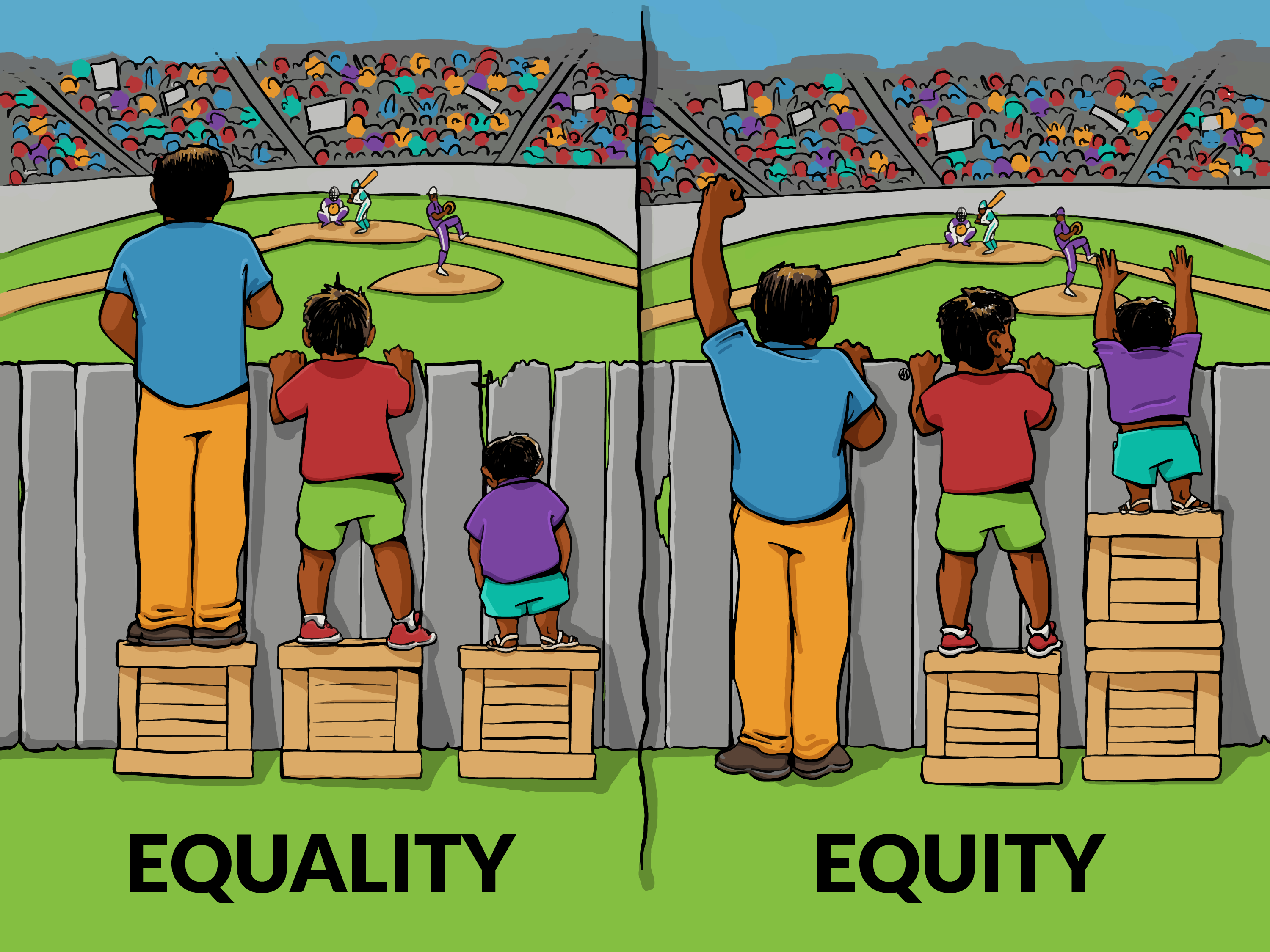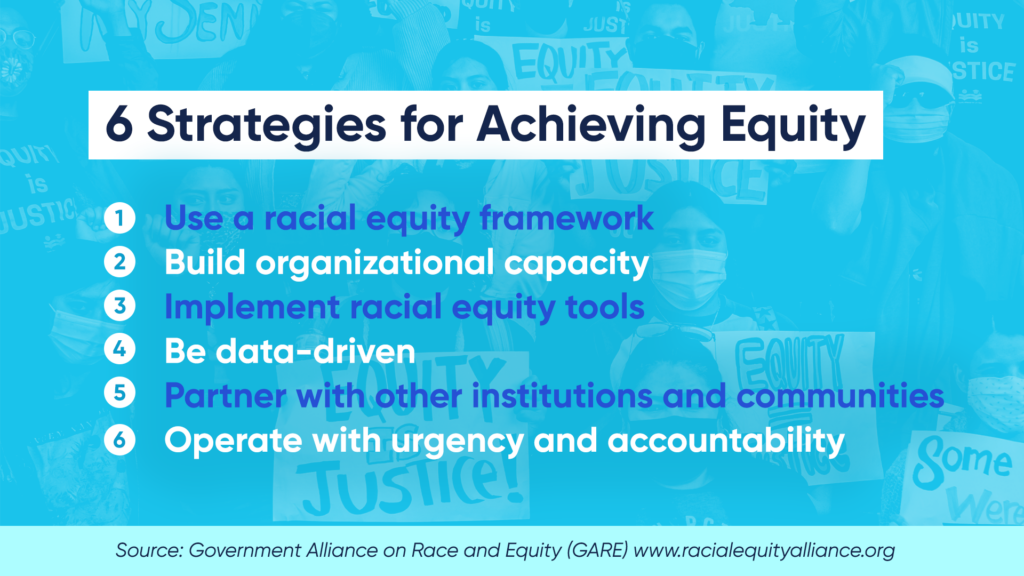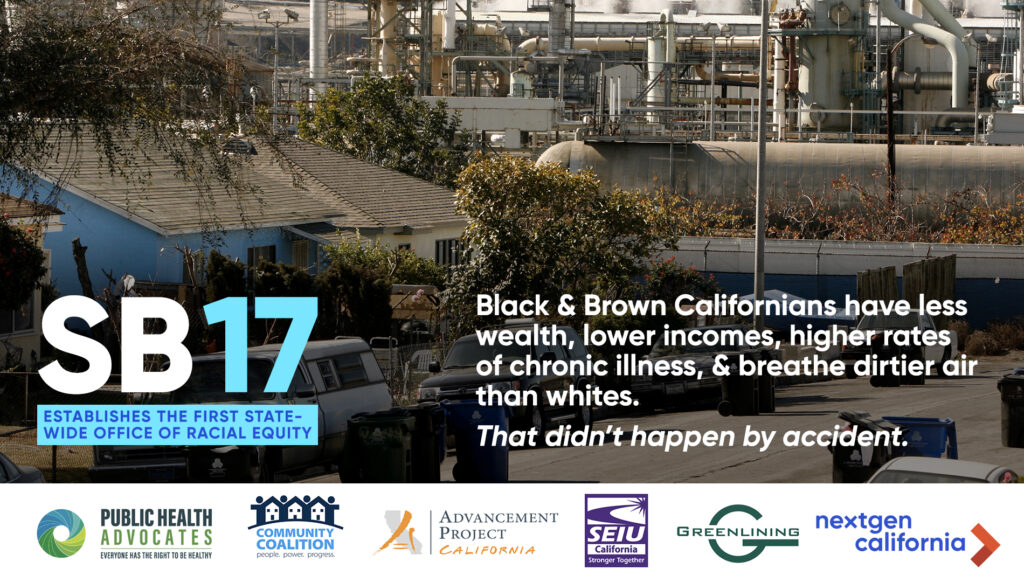What is Equity?
Equity is defined as “the state, quality or ideal of being just, impartial and fair.” Systemic equity is a combination of intersecting elements consciously designed to create, support and sustain social justice. Achieving equity is a dynamic process that reinforces or reimagines equitable ideas, power, resources, strategies, conditions, and outcomes.

Why equity is important?
Social, economic, and racial inequity has existed in America for centuries and the COVID-19 pandemic more clearly exposed as well as exacerbated these conditions. Over the course of the pandemic, we learned that the elderly, frontline workers, communities of color, and indigenous, low-income, and rural communities were disproportionately hit the hardest by the virus and received the fewest resources.
California has begun to identify and address the devastating social and economic impacts of racial disparities. However, achieving equity has consistently been seen as a policy add-on or a separate strategy. To meaningfully combat historic inequities, the state must consciously design strategies to identify and correct inequities, including those that have become even more evident as a result of the pandemic. If the state does not center social, economic, and racial equity in its current and future policy and budgetary decisions, it cannot fully address the needs of impacted communities and truly thrive and move forward.
How do we achieve equity in California?
To advance equity, government must focus on diversity, equity and inclusion but also tackle the institutional legacy of programs and policies that perpetuate the cycle of inequitable outcomes. The following six strategies are critical to achieving and sustaining equity.*

*Source: Government Alliance on Race and Equity (GARE)
What can government do?
The United States is one of the most successful modern democracies in the world, however, our country embedded racial inequality into its founding documents and institutional racism continues to permeate our society in insidious ways. For example, numerous studies identify racism as a public health crisis, leading to significant health disparities, including infant and maternal mortality, chronic disease prevalence, lower life expectancy and now COVID mortality. The role of government must be as a leader in the larger effort to address the effects of systemic racism.
“Creating an Office of Racial Equity would formalize the state’s commitment to addressing long-standing and systematic racial disparities that have often blocked the progress of people of color. It would identify when we are coming up short on achieving economic, social, and racial justice.”
Why should the State of California establish an Office of Racial Equity?
Creating an Office of Racial Equity would further develop the network of government actions necessary to achieve racial equity and improve social and economic outcomes. The goal must go beyond just closing inequity gaps — we must put ourselves on a path that improves outcomes, concentrating on those communities who have been the most disproportionately harmed. Institutional disparities are costly; stifle economic and social mobility; and limit opportunities for us all collectively. To advance equity, our government must not only focus on individual programs but also on policy and institutional levers that are at the root of the inequities – creating an Office of Racial Equity tasked with these goals would help further this process.

*Source: Government Alliance on Race and Equity (GARE)
Resources and articles addressing equity in California
Reports
- California Budget Policy Center : Confronting Racism- Overcoming COVID-19 & Advancing Health Equity
- Policy Link: Center Racial Equity
- American Public Health Association: Creating the Healthiest Nation – Health and Housing Equity
California Racial Equity Action Plans
- Governor’s Office of Planing and Research Racial Equity Plan
- California State Transportation Agency Racial Equity Plan
- California Business, Consumer Services and Housing Racial Equity Plan
- California Environmental Protection Agency Racial Equity Plan
- California Natural Resources Agency Racial Equity Plan
- California Health and Human Services Agency Racial Equity Plan
- California Department of Food and Agriculture Racial Equity Plan
Articles and Op-eds
- Senator Pan op-ed in Cal Matters
- Angela Glover Blackwell & Manuel Pastor op-ed in Capitol Weekly
- Angela Glover Blackwell & Manuel Pastor op-ed in La Opinion(Spanish)
- Kaiser Health News: Lawmakers Pressure Newsom to ‘Step Up’ on Racism as a Public Health Issue
- Why Californians deserve an Office of Racial Equity by Alvaro Sanchez from Greenling Institute
- Confronting Racism: Overcoming COVID-19 & Advancing Health Equity Report by the CA budget & Policy Center
- Ken Jeong op-ed in the Sacramento Bee: California has a chance to advance major AAPI equity bill. It just needs Newsom’s support
Resources are for informational purposes and are not endorsements by NextGen.
